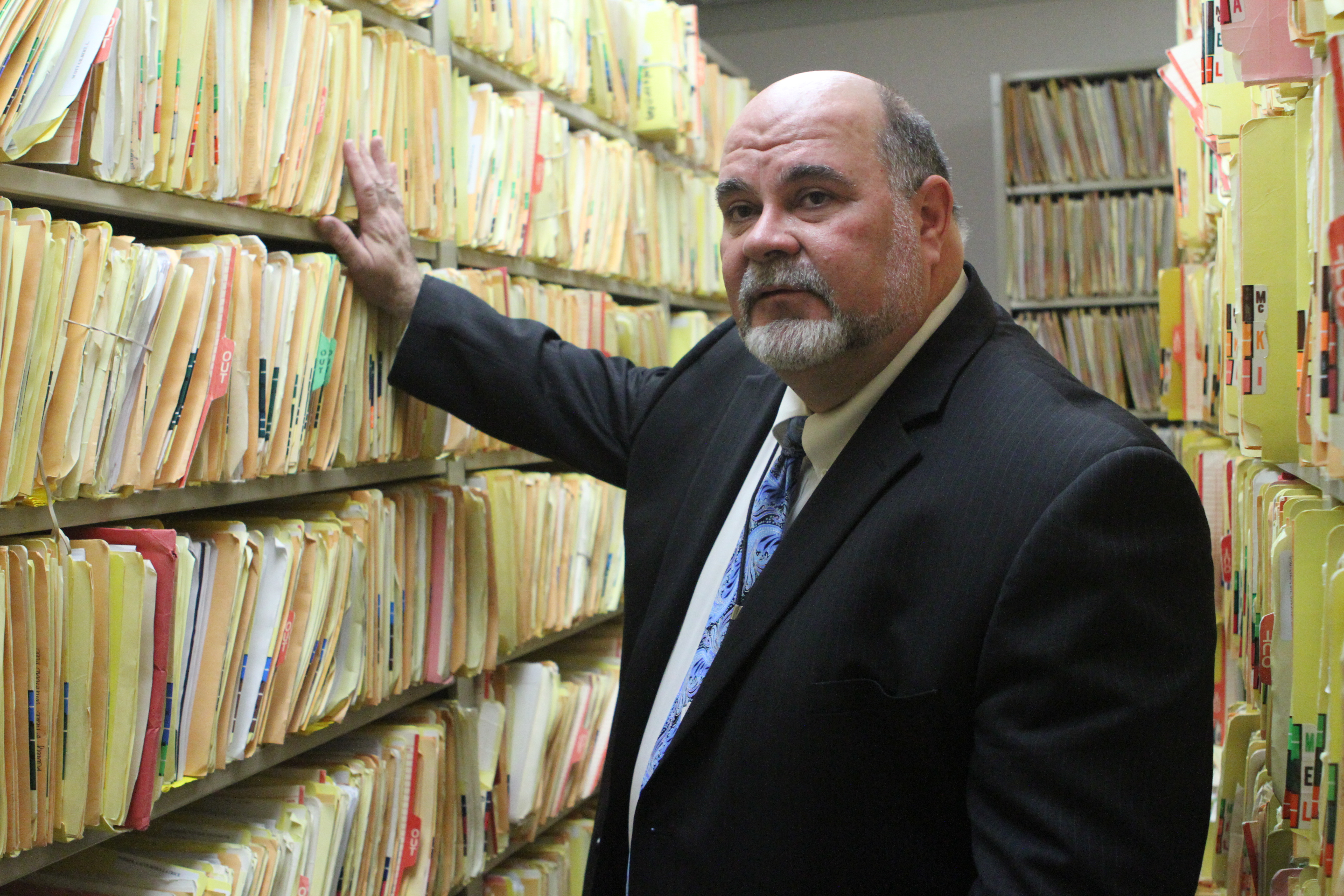Hamilton County Juvenile Court going electronic
Saturday, September 14, 2013
Paper shoved in files, bulging from shelves, holding decades worth of court case information. Files upon files filling rooms, floor-to-ceiling, in two Hamilton County buildings. Clerks, pushing carts, filled with files, to the juvenile courtroom to be opened, read and sent back to the shelves, a little thicker.
At Hamilton County Juvenile Court, clerks are "drowning in paper."
But box by box, that's changing.
Gary Behler, the Hamilton County Juvenile Court clerk, said a massive document scanning project began Aug. 5 that will digitize more than 25,000 records between Juvenile Court and the child support division.
If stacked atop each other, the boxes of files would stand 38 stories, nearly twice as high as Chattanooga's tallest structure -- the 21-story Republic Center building at Seventh and Chestnut streets. If the files were placed on a scale, it would take three elephants at 4 tons each to balance the load.
All of that soon will fit in 300 gigabytes, or a little more than half an average external hard drive with room for a lot of music and photos.
After the project's completion, likely in January, attorneys and judges will be able to view electronic files simultaneously on monitors in courtrooms. Child support clerks will be able to apply payments immediately and pull up data for payees and recipients, ending a sometimes baffling system of file tracking.
The clerk's office is the last in the county to have scanning capabilities, but by early next year will be the most technologically advanced of them all, leaping into the 21st century.
Child support cases are tracked by the last name of the custodial parent receiving payments. Often that is the mother, who may remarry, changing her name.
There have been instances where files were lost in the alphabetical cluster of names, said Christy Cooper, director of the child support division.
Cooper saw old tech and new tech collide firsthand when she accidentally dropped a 4-inch-thick, coffee table-sized rule docket book on her smartphone and broke the device.
The docket books hold line after line, much like an old accounting ledger, for entries to case files. Sheets of ruled paper taped inside the books' pages extend the entries for a particular file. Minor errors can leave a file lost in a sea of paper.
But with the scanned documents a clerk can search items by either parent's name or other key terms.
Chrissy Mincy, a local defense attorney who works with child support cases, said the digital system will streamline much of her work.
"The clerks there are phenomenal; I don't know how they keep up with all of the paperwork," she said.
The instant-access, cross-referencing capabilities will save a lot of time and money, she said.
Behler has talked with state-level child support coordinators in Nashville and asked to have Hamilton County serve as a pilot program for electronic notifications on child support, eliminating baskets of mailed filings between the Scenic City and Nashville.
"I think it's going to radically change how we are doing business," Behler said. "Our goal is to be able to manage everything we previously did on paper electronically."
When Behler took over in November 2011, workers didn't even have email.
The document scanning is one link in a long chain of technology improvements in both the courtroom and in the clerk's office. In recent years the Hamilton County Commission has committed $260,000 on technology improvements in the clerk's office and $74,000 more for parallel improvements in the courtrooms.
But the price tag could have been much larger. Behler said Hamilton County Mayor Jim Coppinger consulted with the county's information technology department, and programmers there developed the software that served as the backbone of the two offices.
Software companies had quoted a cost of the system between $200,000 to $300,000 plus an annual $50,000 license fee, Behler said.
The seven courtrooms, four in Juvenile Court, three in child support, have recently been wired with video monitors at the judge and attorney tables. Larger screens await hookups to begin video arraignments and hearings to cut down on transporting juveniles from the detention center or across state when a meeting is necessary.
Hamilton County Juvenile Court Judge Rob Philyaw said what the clerk's office is doing will streamline a lot of logistical work.
"The paper files that we lug around and the clerk drags in the court are going to cease being used," Philyaw said. "All the right people will be able to access the right information at the right time."
The tracking system that manages the files isn't open to public access, but allows attorneys the ability to quickly reference a file in the building, he said.
All of the improvements ultimately are aimed at helping manage children's cases to get them the best services, the judge said.
Assistant District Attorney Boyd Patterson said the technology improvements will save time for attorneys, allowing more time for working with the children.
Patterson independently developed JuryStar, a jury selection smartphone application for lawyers to use in court. The app was twice nominated as Best Trial Preparation App in American Lawyers magazine.
"If you want to push the envelope, you simply look at where paper is still being used," Patterson said. "And I guarantee you there's a tech solution that can be applied."
Juvenile Court Administrator Sam Mairs said the $74,000 spent in the courtrooms likely saved hiring three new employees over three years.
"Before, everything was very labor intensive; it took a lot of people to move paper from one place to another all day long," Mairs said. "It's become kind of obvious to us that our budgets are not going to explode any time soon."
Of all the courts in operation, juvenile courts have the strictest rules for keeping information secret.
The court's records system connects directly to the county's IT department downtown and is protected by multiple firewalls. Anytime a pre-approved user accesses a file the system logs who opened it, when and what changes were made.
That's part of the reason the scanning process will take nearly six months, Behler said.
Unlike most digital scanning, the court isn't simply making copies for storage or backup, Behler said. This project is working with closed files, open files and new files, all of which could be changed at any time, depending on a court ruling. And most of them must be available in print form at the judge's request, even while being scanned.
A paper backup file will still be created, to stay in compliance with state law, Behler said. The system is not paperless, but paper-on-demand.
Every three days a load of seven, 50-pound boxes is taken to a team of scanning workers with DigiPoint Solutions in Cookeville, the private company that won a $154,000 bid for the project.
The files move through six rooms for separation, scanning, review, reassembly and quality checks overseen by clerk's office employees Rhonda Wheeler and Kristie McGowan.
Sheet by sheet, each file becomes 1's and 0's, bits of data that then appear on a screen.
And with each sheet the mountains of paper dwindle.
Contact staff writer Todd South at tsouth@timesfree press.com or 423-757-6347. Follow him on Twitter @tsouthCTFP


